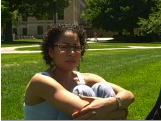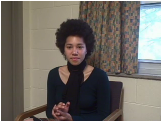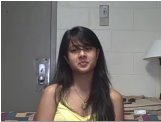Navigation:
Video Segment 2: What were your parents' attitudes toward literacy and/or education?
Video Segment 3: How would your life be different if you didn't know how to read and write?
Video Segment 4: What is your experience with and attitude toward computers?
Lessons 1 & 2: Narrating Technology Use
Lesson 3: Technology Resistance
Lesson 4: Complexity of Technological Engagements
Working Definitions of Technological Literacy and Narrative Analysis
- Chanelle Mays Transcript
- Saffiyah Madraswala Transcript
- Viktoriya Kamara Transcript
- Anne Jacobs Transcript
Although all four of these women have a parent with at least one advanced degree, the ways in which they portray their parents' attitudes toward education are significantly different. All four of these women are considering pursuing advanced degrees and have made it through at least three years of undergraduate work at a traditional age. All four of the women indicate that the acquisition of degrees is valued by their families. Notably, none of the young women express any concerns about acquiring education that might alienate them from their families, as we often see in narratives of people who grew up in poverty and/or are racial minorities (Young, 2007).
Saffiyah Madraswala, in particular, positions herself in opposition to her parents, whom she portrays as valuing education but also subscribing to materiality, specifically financial wealth rather than "better[ing] yourself as a person." In contrast, Madraswala, implicitly here, and later explicitly, claims to value education and literacy acquisition as a means of bettering herself as a person. Here and throughout the interview, we can find moments where Madraswala contrasts her own and her parents' values and attitudes, and aligns herself with what might be considered a liberal academic attitude toward education and literacy. We might see this distinction as connected to the one C. H. Knoblauch (1990) makes in separating functional literacy from cultural or personal growth or critical literacy.
Viktoriya Kamara also portrays her parents' as valuing literacy for its effect on personal growth: "It's probably from education that you allow your mind to open up to things." Kamara describes this as a cultural, and not racial, value that her parents share with her.
Anne Jacobs notes that her mother's concern for her daughter's grades demonstrates the value she places on education. Her mothers concerns about this external marker of validation suggests her mother's investment in the education system and her belief that grades will matter in Jacobs' ability to succeed later. Jacobs also acknowledges that her father went straight to work after high school, which is what was expected of him so that he could earn a living for his family. In the case of her family, Jacobs' father's whose educational opportunities were constrained by gender roles and expectations.
Uniquely among these four young women, Chanelle Mays says that her parents hope their children will acquire more education than they were able to acquire. This desire, specifically from her white mother, seems quite similar to a version of the so-called American Dream, which holds that each generation will have more education, higher earning potential, and easier lives than the previous generation. The way in which Mays reports this story here indicates that she has been largely persuaded by this desire of her parents. Compare her attitude with Madraswala's resistance to her parents very similar definition of the American Dream.



